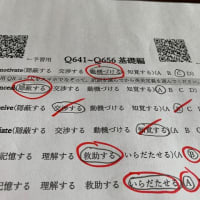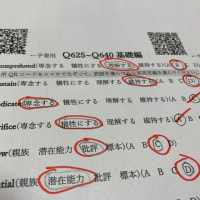大学入試二次試験に見られる英文和訳や和文英訳のような古臭い田舎英語を日常的に演習しなくても、英語力を伸ばすことは十分可能です。というよりも、いかに日本語の介在を抑えるかが英語力を伸ばすカギになります。
以下は今年のセンター試験の長文から作成した、文脈に合った文字を●の数だけ入れるきわめて単純な練習問題ではあるものの、日本語を介在させることなく英語思考力を強化できます。
原文は、 2009年度センター試験(英語)を振り返ってを参照してください。
When I first entered university, my aunt, who is a professional translator, gave me a new English dictionary. I was ●●●zled to see that it was a monolingual dictionary, which meant that everything was in English. Although it was a dictionary ●●●●nded for learners, none of my classmates had one and, to be honest, I found it extremely difficult to use at first. I would look up words in the dictionary and still not fully understand the meanings. I was used to the familiar bilingual dictionaries, in which the entries are in English and their equivalents are given in Japanese. I really ●●●dered why my aunt decided to make things so difficult for me. Now, after studying English at university for three years, I understand that monolingual dictionaries play a crucial ●●le in learning a foreign language.
When I started to learn English at the age of ten, I wanted to pick up as much basic vocabulary as possible and created what might be called a simple bilingual “dictionary” for myself. This ●●●sisted of English words and their equivalents in Japanese written on cards. I would put the English word on one side of a card and the Japanese equivalent on the other. I found this to be a ●●●venient tool for memorizing basic everyday words.
In high school I was assigned longer texts which had a larger vocabulary, so I started to use a standard English-Japanese bilingual dictionary. Such dictionaries ●●●tain a large number of commonly used English words. Each item comes with a pronunciation guide, its equivalents in Japanese, a note on its grammatical ●●●ctions, and examples of how it is used.
For ●●●se working as professional translators and interpreters, there are more specialized bilingual dictionaries. My aunt often translate articles submitted to international medical journals, so she uses a bilingual dictionary devoted to medicine. Such dictionaries, ●●●●lable in various fields, tend to omit words like “come” or “go” used in an everyday sense; on the other hand, they contain highly specialized terms not found in standard bilingual dictionaries. For example, in a bilingual medical dictionary, one can find a term like “basal body temperature,” which is unfamiliar to most people ― an expression ●●ferring to the temperature when the body is at rest.
Then, if bilingual dictionaries are so useful, why did my aunt give me a monolingual dictionary? As I found out, there is, in fact, often no perfect equivalence ●●●ween words in one language and those in another. My aunt even goes so far as to claim that a Japanese “equivalent” can never give you the real meaning of a word in English! Therefore she ●●●isted that I read the definition of a word in a monolingual dictionary when I wanted to obtain a better understanding of its meaning. Gradually, I have come to see what she meant.
Using a monolingual dictionary for learners has benefited me in another important way ― my passive vocabulary (words I can understand) has increasingly become an active vocabulary (words I actually use). This dictionary uses a ●●mited number of words, around 2,000, in its definitions. When I read these definitions, I am repeatedly exposed to basic words and how they are used to ●●●lain objects and concepts. Because of this, I can ●●●ress myself more easily in English.
Once I got used to the monolingual dictionary for learners, I ●●●covered another kind of monolingual dictionary, which is particularly useful when writing essays or preparing presentations. This is what can be called a “find-the-right-word” dictionary. This kind of dictionary ●●ables me to come up with an alternative, and sometimes more precise, expression for a word I am already familiar with. For example, if I look up “difficult,” I will find a group of related terms such as “challenging,” “tough,” “hard,” and “demanding.” A word like “important” will lead me to “significant,” “crucial,” “essential,” “influential,” and “major.”
What I realize now is that both monolingual and bilingual dictionaries have particular uses, and your choice of dictionary ●●●ends on your aims. If you wish to understand the general meaning of texts in a foreign language and have no need to express your own ideas in the language, you may find a bilingual dictionary sufficient. If you work as a professional translator, you will find it ●●●●ssary to use specialized bilingual dictionaries. However, if your ultimate goals are to understand a foreign language clearly and to speak or write the language using a variety of words, I strongly ●●commend that you obtain a monolingual dictionary once you have command of a basic vocabulary. I feel I ●we the progress I have made in English to the wisdom of my aunt.
以下は今年のセンター試験の長文から作成した、文脈に合った文字を●の数だけ入れるきわめて単純な練習問題ではあるものの、日本語を介在させることなく英語思考力を強化できます。
原文は、 2009年度センター試験(英語)を振り返ってを参照してください。
When I first entered university, my aunt, who is a professional translator, gave me a new English dictionary. I was ●●●zled to see that it was a monolingual dictionary, which meant that everything was in English. Although it was a dictionary ●●●●nded for learners, none of my classmates had one and, to be honest, I found it extremely difficult to use at first. I would look up words in the dictionary and still not fully understand the meanings. I was used to the familiar bilingual dictionaries, in which the entries are in English and their equivalents are given in Japanese. I really ●●●dered why my aunt decided to make things so difficult for me. Now, after studying English at university for three years, I understand that monolingual dictionaries play a crucial ●●le in learning a foreign language.
When I started to learn English at the age of ten, I wanted to pick up as much basic vocabulary as possible and created what might be called a simple bilingual “dictionary” for myself. This ●●●sisted of English words and their equivalents in Japanese written on cards. I would put the English word on one side of a card and the Japanese equivalent on the other. I found this to be a ●●●venient tool for memorizing basic everyday words.
In high school I was assigned longer texts which had a larger vocabulary, so I started to use a standard English-Japanese bilingual dictionary. Such dictionaries ●●●tain a large number of commonly used English words. Each item comes with a pronunciation guide, its equivalents in Japanese, a note on its grammatical ●●●ctions, and examples of how it is used.
For ●●●se working as professional translators and interpreters, there are more specialized bilingual dictionaries. My aunt often translate articles submitted to international medical journals, so she uses a bilingual dictionary devoted to medicine. Such dictionaries, ●●●●lable in various fields, tend to omit words like “come” or “go” used in an everyday sense; on the other hand, they contain highly specialized terms not found in standard bilingual dictionaries. For example, in a bilingual medical dictionary, one can find a term like “basal body temperature,” which is unfamiliar to most people ― an expression ●●ferring to the temperature when the body is at rest.
Then, if bilingual dictionaries are so useful, why did my aunt give me a monolingual dictionary? As I found out, there is, in fact, often no perfect equivalence ●●●ween words in one language and those in another. My aunt even goes so far as to claim that a Japanese “equivalent” can never give you the real meaning of a word in English! Therefore she ●●●isted that I read the definition of a word in a monolingual dictionary when I wanted to obtain a better understanding of its meaning. Gradually, I have come to see what she meant.
Using a monolingual dictionary for learners has benefited me in another important way ― my passive vocabulary (words I can understand) has increasingly become an active vocabulary (words I actually use). This dictionary uses a ●●mited number of words, around 2,000, in its definitions. When I read these definitions, I am repeatedly exposed to basic words and how they are used to ●●●lain objects and concepts. Because of this, I can ●●●ress myself more easily in English.
Once I got used to the monolingual dictionary for learners, I ●●●covered another kind of monolingual dictionary, which is particularly useful when writing essays or preparing presentations. This is what can be called a “find-the-right-word” dictionary. This kind of dictionary ●●ables me to come up with an alternative, and sometimes more precise, expression for a word I am already familiar with. For example, if I look up “difficult,” I will find a group of related terms such as “challenging,” “tough,” “hard,” and “demanding.” A word like “important” will lead me to “significant,” “crucial,” “essential,” “influential,” and “major.”
What I realize now is that both monolingual and bilingual dictionaries have particular uses, and your choice of dictionary ●●●ends on your aims. If you wish to understand the general meaning of texts in a foreign language and have no need to express your own ideas in the language, you may find a bilingual dictionary sufficient. If you work as a professional translator, you will find it ●●●●ssary to use specialized bilingual dictionaries. However, if your ultimate goals are to understand a foreign language clearly and to speak or write the language using a variety of words, I strongly ●●commend that you obtain a monolingual dictionary once you have command of a basic vocabulary. I feel I ●we the progress I have made in English to the wisdom of my aunt.























※コメント投稿者のブログIDはブログ作成者のみに通知されます